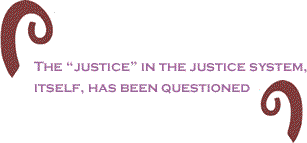With
the signing of a death penalty abolition law in Connecticut
at the end of April, the U.S.
moved toward general abolition of the death penalty as
a sentence, but the Nutmeg state is only the 17th in the
nation to end its use.
The
country is moving painfully slowly toward joining the
developed countries of the world in eliminating official
state killing of people in its charge. Although there
are many arguments heard on both sides of the issue, it
seems clear that knowing that one might be subject to
the death penalty is not a deterrent to a crime of passion
or a crime committed by an unbalanced personality.
A
life sentence without possibility of parole would seem
to serve the same purpose for those who believe that the
death penalty is a preventive measure, but the debate
rages on and Americans, in general, seem to be of many
different minds about it. Depending on which polls are
consulted, and how the question is presented, the country
remains split rather evenly on continuing use of death
as a punishment.
The
continuing debate on the matter involves whether a sentence
of death is justice or revenge. Often, when Americans
are questioned about it and an alternative sentence of
life without the possibility of parole is offered, the
numbers jump considerably in favor of the alternative
and against death. In that light, Connecticut is in line with those who prefer the
alternative, and the bill signed into law by Governor
Dannel P. Malloy provides that alternative.

There
are just 33 states left to consider abandoning the death
penalty, in the absence of a federal law to ban the practice.
What is interesting is that the Connecticut law comes just 226 years after the first �state� in the
world, Tuscany,
abolished the death penalty in 1786. After unification,
Italy abolished the death
penalty in 1889, except for the 21-year period of fascist
rule that began in 1926.
The
advent of the Innocence Project, in which DNA testing
has been used in many high profile cases to secure the
removal from the prison system of many persons wrongly
convicted of crimes, including many on death row, has
changed the way most people view the U.S. incarceration
rate and the application of the death penalty. The �justice�
in the justice system, itself, has been questioned, and
there are innumerable examples of injustices that could
have been prevented, but those in power refused in many
cases to �rock the boat� and call for a new trial, based
on new evidence or evidence that was suppressed in the
original trial.
That�s
why the Innocence Project is such a revelation: because
it�s based on DNA, which provides truly scientific evidence
of innocence. Building a case for finding a convicted
person innocent is a time-consuming project, so the numbers
are quite low, when compared with the number of inmates
in America�s prisons.
In
2010, there were some 2.2 million in U.S. prisons and jails. This is in a population
in that year of 308,745,538. Black or African-Americans
made up just 12.6 percent and Latinos made up 16.3 percent
of the population. Yet, black inmates made up 41.58 percent
of death row inmates, Hispanic made up 11.34 percent,
and whites made up 44.74 percent, according to 2009 figures
from the NAACP Legal Defense Fund.
There
is a persistent attitude that criminals, especially those
who murder or commit other acts of physical harm to victims,
�deserve to die,� and there are plenty of crimes which
seem to warrant such a final disposition. This is especially
true among the families and friends of the victims. But,
remarkably, there are those victims� families who can
summon up the courage and compassion to forgive the perpetrator,
although they might not want to see them out of prison
for their lifetime.
The
Connecticut governor, in signing the bill, noted
that this is �a time for sober reflection, not celebration,�
and he included in his statement that the state�s death
penalty law was unworkable and that had had influence
in his decision to sign the bill to abolish. Malloy, however,
did not unequivocally decide to abolish on the basis that
the death penalty is wrong and that the state�s taking
of a life is wrong. Rather, he mentioned the �appeal after
appeal,� for which (sometimes great) expenses the taxpayers
are liable. For the most devoted proponents of a death
sentence, the expense of the appeals do not seem to matter,
no matter how often it is pointed out that a life sentence
without possibility of parole is cheaper than sentencing
someone to death.

Toward
the end of the Age of Enlightenment, public opinion on
the death penalty was affected in part by the publication
of �On Crimes and Punishments,� written by Cesare Baccaria
and published in 1764. The young man�s (he was 26) writing
had an effect on Enlightenment figures, such as Voltaire.
It was not the only writing on crime and punishment, but
it had great influence among the enlightened.
Baccaria�s opposition to the death penalty was twofold:
Because the state does not possess the right to take lives;
and because capital punishment is neither a useful nor
a necessary form of punishment. Since that time, the arguments
against capital punishment have been along the same lines,
whether or not either side had ever heard of Baccaria.
The
U.S. holds a rather unique place among the so-called
developed nations, in being one of the few that holds
fast to the death penalty, regardless of opinion polls
at any given time. Although the federal government has
its own set of laws regarding its use of the death penalty,
all 50 states have their own laws regarding use of capital
punishment and, as we have seen, only 17 have stopped
using it.
Of
great concern to death penalty opponents is the lopsided
use of it against black citizens and other minorities.
But then, the ratio of black prisoners to white prisoners
in the various states� prisons and jails might give an
indication (leaving the philosophy of application of law
for another discussion) of how the death penalty would
be dispensed.
One
would think that the �liberal� states of the Northeast
and upper Midwest would have the
smallest disparity in incarceration rates, but one would
be wrong. For example, New
York has a rate of black-to-white prisoners of 9.4-1.
In New Jersey, it�s 12.4-1. In Massachusetts, it�s 8.1-1. In Wisconsin,
it�s 10.6-1. In Connecticut, it�s
12-1, and in Vermont,
it�s 12.5-1.
Here�s
a sampling of incarceration rates, black to white prisoners,
in some other states: In South Carolina, it�s 4.5-1. In
Georgia,
it�s 3.3-1. In Texas,
it�s 4.7-1. In Mississippi and Alabama, it�s 3.5-1. In Louisiana, it�s 4.7-1, and in Arkansas, it�s 3.9-1. These numbers come from the
Sentencing Project, which monitors the judicial system,
including the incarceration ratios.
What�s
going on here in this disparity of rates should be a specific
subject in the long-standing debate about racism in the
judicial system. This is a tough debate, because there
are 50 states and one national government, each with its
own set of laws and its own set of applications of those
laws and their own prison systems. Naturally, this would
not include the privatized prisons and the question about
who the owners of those prisons answer to, regarding issues
of individual rights under the U.S. Constitution.

What
we do know is that the incarceration rate destroys black
families; it destroys family and community life among
other minorities, as well. And, the diminishing use of
the death penalty shows us that Americans are not exactly
for it, but they haven�t decided to abolish it. Martin
Luther King Jr. said that the �arc of the moral universe
is long, but it bends toward justice��
Like
the justness of the wars which the U.S. continually wages,
the death penalty should be in constant sight of Americans,
debating not only the likelihood that we will engage in
the former or carry out the latter, but we should be debating
the morality of both. Politicians are made uncomfortable
by discussing the morality or ethics of political acts,
but the people must make them open the debate.
The
abolition of the death penalty in Connecticut
might be a good place to start. Let�s hope we don�t have
to wait for another Enlightenment to eliminate the death
penalty in the rest of the country.

BlackCommentator.com
Columnist, John Funiciello, is a labor organizer and former
union organizer. His union work started when he became
a local president of The Newspaper Guild in the early
1970s. He was a reporter for 14 years for newspapers in
New York State. In
addition to labor work, he is organizing family farmers
as they struggle to stay on the land under enormous pressure
from factory food producers and land developers. Click
here
to contact Mr. Funiciello.

